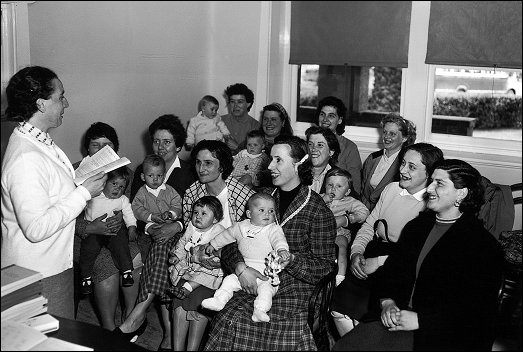Magda and Susan

Photograph, John Owens.
Magda: My husband and I are Egyptian but my husband was resident in Australia and I met him in Egypt when he was visiting his family. We married and I came to live in Australia with him in the 1970s. I was very happy to come to Australia because I felt that I needed a change but when I arrived I felt very unhappy. Everything was different: the language, the landscape and the culture. I couldn’t speak to anyone and my husband started work straight after we arrived so I was stuck between the walls of the flat and was very lonely.
My husband only knew about four Egyptian families in Melbourne at the time and they lived in far off suburbs so I had no friends. I missed my family very much and I just cried and cried and cried. I felt like a baby who has to learn everything from the beginning again.
A week after I arrived in Australia I went to hospital because I was so unhappy but the doctor said there was nothing wrong with me. He said it was just psychological because I had married and left Egypt so quickly.
I became pregnant soon after arriving in Australia. When I had young children to care for things were a little better because I had something to do but still I was lonely.
I always speak to my children in Arabic so they have learnt the language very well but sometimes I speak to them in Arabic and they answer me in English.
It is hard to learn a new language when you are an adult. My husband never encouraged me to learn English, telling me that English was much harder to learn than Arabic. But when my sister Susan came to Australia in the early 1980s she encouraged me to go to TAFE and study English.
Once I spoke some English I was able to get work in a factory and earn some money. After ten years in the country I was able to buy a car and take driving lessons so I was not as isolated.
Later while I was working in the factory, I saw people in the office and I was jealous because that was the sort of work I did in Egypt. Susan encouraged me to go back to TAFE and study accounting and business and I was very lucky to get a job as a clerical assistant. I know my English is not very good but this is not forever. I am still learning.
Susan: My migration experience was very different from my sister’s. After I finished studying in Egypt I went to work in an American hospital in the Gulf and during my holidays I came to visit my sister Magda in Melbourne. I liked Australia and I knew Magda needed family support. I didn’t want to go back to live in Egypt because I didn’t think the economic situation there was very bright. I applied for a visa to migrate to Australia, which took about three years to be approved, and I arrived in Australia in the early 1980s.
Egypt is very different from Melbourne. It has a Mediterranean climate with sunny weather all year round and the streets are always full of life, even at two or three o’clock in the morning.
The biggest difficulty I had was getting my qualifications and experience recognised in Australia. Although I finished university in Egypt and worked for many years I found that, when I came here, I had to start all over again and study. This was very frustrating. I had to fight and struggle to get my qualifications recognised. I think it is very tough that Australia encourages educated people to migrate and then makes us do odd jobs. If I had known this before I arrived I may have thought differently about coming here.
When Magda applied to study English she experienced difficulty in getting into courses because she had already lived in the country for a few years. I think the system should be more flexible for people in Magda’s situation who missed their first chance to learn English.
I feel people from non-English speaking countries are very disadvantaged here because it is so hard for them to express themselves.
